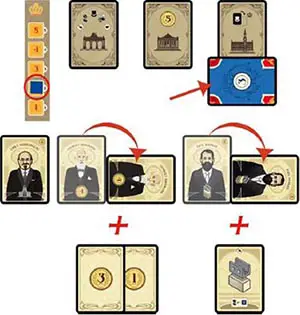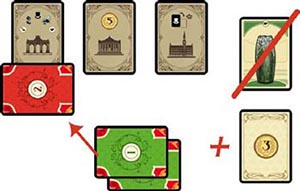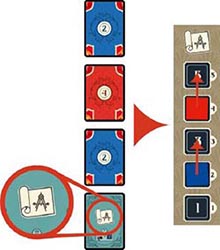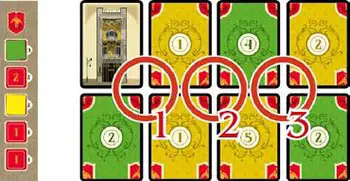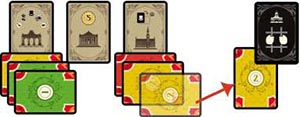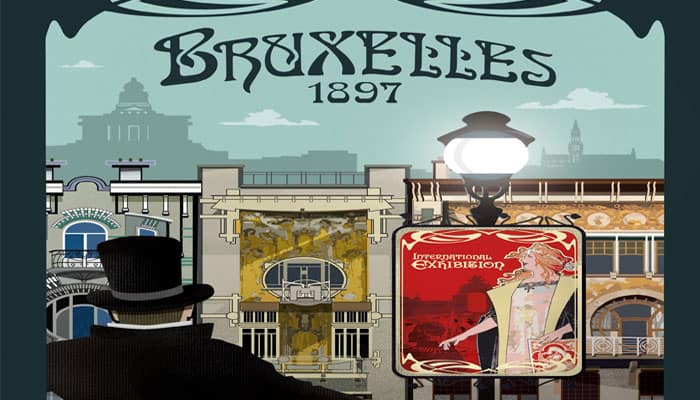
The year is 1897. Art Nouveau is taking over the streets of Brussels as the World's Fair opens its doors. The time has come to cement your name in the History of Art. In order to establish your reputation, you will exhibit and sell your works of art, construct architectural masterpieces, and expand your social circle.
Bruxelles 1897 is a strategic card game which is played over 4 rounds. During your turn, you will use your Architect cards to perform actions in the Art Nouveau and Brussels areas.
At the end of each round, the position of your cards will determine your majorities and which bonuses you will collect. At the end of the game, the player with the most victory points will be crowned Architect of the Year!
Components

- 1 Game Board
- 4 Bonus cards
- 1 Prison card
- 3 Brussels cards
- 16 markers
- 1 Round marker
- 1 First Player card
- 28 Architect cards
- 83 Action Cards
- Rulebook
Setup

-
Unfold the Game Board and place it at the top of the play area. Place the Round marker on the first square of the Round track
Aand the Expo card onto the Exhibition areaB. -
Place the 3 Brussels cards and the Prison card face up in front of the Game Board. This is the Brussels area
C. -
Sort the 82 remaining Action cards according to type, then:
Each player receives the Georges Brugmann Noble card and places it face up in front of them
D. Any remaining Georges Brugmann cards are returned to the box.Create a pile of Money cards and place it at the bottom of the play area. Shuffle the Artwork, Material, House, and Noble cards separately and create 4 face-down draw piles with them. Place these piles next to the Money cards
E.
-
Prepare the Art Nouveau area as follows
F:Take 3 or 4 cards (for a game with 2-3 or 4 players, respectively) from each of the 5 draw piles. Take the Expo card and place it somewhere in the middle. Now thoroughly shuffle these cards together.
Randomly place 12 of these cards (in a 2 or 3-player game) or 16 of these cards (in a 4-player game) face up, based on the image below. The Money cards must be placed in such a way that their side of 3 Belgian Francs (BEF) is facing up.

In a 2-player game, discard the Action cards in the corners of the bottom row and replace them with value 2 Architect cards of an unused color.
Discard any remaining Artwork, Material, House, and Noble cards face up in front of their respective draw piles
G. Place any remaining Money cards back on their pile. If the Expo card is not in play, place it onto the Exhibition area.It is possible that during a round a certain type of Action card is not present in the Art Nouveau area.
-
Shuffle the 4 Bonus cards and randomly place one face up beneath each column
H. -
Players receive the 7 Architect cards and 4 markers in their chosen color. Each player places:
One 2/4 card and one 2/5 card underneath the Prison card. In a 2-player game, place only the 2/5 card there
I.One of their markers on the first square of the Victory Point (VP) track and one on the first square of the Architecture, Nobility, and Prestige tracks
J.

-
Determine a starting player who receives the 1st Player card and 4 Belgian Francs (BEF)
K.The second player receives 5 BEF, the third player 6 BEF, and the fourth player 7 BEF. Players place their Money cards face up in front of them.
Note that the Money cards can show a value of 1 BEF or 3 BEF. The total of all visible values determines your amount of money in BEF. To avoid confusion, keep your Money cards face up in front of you at all times.

Game Play
The game consists of 4 rounds, which are separated into 3 consecutive phases: the Preparation phase, the Action phase, and the Majority phase.
1. Preparation Phase
Starting from the second round, the round preparation takes place as follows:
Move the Round marker one square to the right. Then, give the 1st Player card to the player holding the Expo card and place this card back onto the Exhibition area. If none of the players have taken the Expo card, the 1st Player card passes to the player seated to the left of the previous first player.
Take your Architect cards back into your hand, except those under the Prison card.
Discard the Action cards from the Art Nouveau area that were not purchased in the previous round.
Reset (untap) your Noble cards so they can be activated again.
Prepare a new Art Nouveau area as described in point 4 of the setup. If there are empty draw piles, shuffle their respective discard piles and create new, face- down draw piles.
Shuffle the 4 Bonus cards and randomly place one face up beneath each column.
2. Action Phase
During your turn, you may perform an action in the Art Nouveau Area or the Brussels area, or pass. You will use your Architect cards to perform the actions. You may keep your Architect Cards in your hand, but they are not secret information. At any point during the game, another player may ask to look at your cards.
A. Actions in the Art Nouveau Area

Swap an Action card from the Art Nouveau area with one of your Architect cards.
It is up to you to decide which side of your Architect card you want to use, but you need to immediately pay the amount of money depicted on the chosen side.
You are not allowed to perform actions in the Art Nouveau area if you are unable to pay for them. Used Money cards go back to their draw pile.
Next, perform the action associated with the card you purchased:
 Creation: Place the Artwork card face up in front of you. You need to own an Artwork to be able to perform the Sale action.
Creation: Place the Artwork card face up in front of you. You need to own an Artwork to be able to perform the Sale action. 

Sale: Place the Money card in front of you with the value 3 side facing up. Discard one of your Artwork cards. You are not allowed to use the money of the sale to pay for the Architect card you just played.
 Supply: Place the Material card face up in front of you. Each card shows 2 Materials (steel, brick and/or wood). You need to own Material cards in order to perform the Construction action.
Supply: Place the Material card face up in front of you. Each card shows 2 Materials (steel, brick and/or wood). You need to own Material cards in order to perform the Construction action. 

Construction: Place the House card face up in front of you and discard one or more Material cards, depending on the construction cost: 1 Material for your first House, 2 Materials for your second House, and so on.
You must discard a Material card, even though you are only using 1 of the 2 Materials depicted on it. You may spend any types of Material. However, you receive 1 VP per type of Material you used in the construction.

Influence: Use the effect of the Noble. Then, you have to choose to either discard the Noble card, or to keep it in front of you for the rest of the game. You are not allowed to keep two identical Noble cards.
If you choose to keep the Noble, tap the card 90° to indicate that you have already used it this round. You may only activate each Noble once per round.
At the end of the game, you must pay 2 BEF for each Noble card you decided to keep.
Example: Claudia constructs her third House, which costs 3 Materials. She discards 2 Material cards, one that has 2 bricks and one that has 1 brick and 1 wood. She therefore uses 2 types of Material. The third brick is lost. She gains 2 VP (1 for the brick and 1 for the wood).
Effects of the Nobles

Georges Brugmann: Collect 4 BEF.

Prince Albert: Ad+vance your marker 1 square on the Nobility track.

Charles Buis: Advance your marker 1 square on the Prestige track.

Victor Horta: Advance your marker 1 square on the Architecture track.

Paul Hankar: Draw 2 Material cards. Choose one to discard and one to place face up in front of you.

Emile Vandervelde: Choose one of your Architect cards underneath the Prison card and take it back into your hand.
Example: John purchases the Emile Vandervelde card, which allows him to immediately retrieve one of his cards underneath the Prison card.
Because he already has an Emile Vandervelde card in front of him, he has to discard the card he just purchased.

Exhibition: Place the Expo card in front of you to indicate that you have started an exhibition in which all players may participate.
Starting with you and then in a clockwise order, the players choose one of their Artwork cards to exhibit for 2 VP. Two identical Artworks may not be exhibited during the same exhibition. The exhibited Artwork cards are not discarded.
The exhibition is over when there are no players left who can participate, or when all 4 colors have been exhibited. A player who has passed before the start of the exhibition is not allowed to participate in it.
You may purchase the Expo card even if you don't own any Artworks. The player who purchased the Expo card will become the new starting player for the next round.
Example: John purchases the Expo card. He exhibits a red Artwork and gains 2 VP. Claudia exhibits a yellow Artwork and gains 2 VP. Rob and Scott do not have any Artworks and therefore do not participate in the exhibition.
It is John's turn again. He does not have any other Artworks, so he can no longer participate. Claudia still has a red and a blue Artwork. Because a red Artwork has already been exhibited, she can only exhibit her blue one for 2 additional VP. Since nobody owns a green Artwork, the exhibition ends.
John has purchased the Expo card, so he will be the new starting player for the next round.
Important
The Action cards in front of you and the Architect cards in your hand must be visible to the other players at all times.
The value and location of the Architect cards in the Art Nouveau area will determine the majorities.
Even if you no longer have Artwork cards for sale or Material cards to construct with, you may still place an Architect card in the Art Nouveau area to compete for majorities. In this case, pay for placing down your Architect card as normal, but discard the purchased Action card.
B. Actions in the Brussels area
Place one or more Architect cards in front of the Brussels card of your choice. You must place one card more than the previous player who took the same action: the first player places 1 card to take the action, the second player places 2 cards to take the same action, and so on.
Unlike the Art Nouveau actions, you do not need to pay for the placement of your Architect cards in this area. Ihe value of the card is of no importance when performing these actions.
Lastly, perform the action on the chosen Brussels card:

Stock Exchange: Collect 5 BEF.

City Hall: Activate the effects of one or more of your Noble cards (see p.6). Ihe maximum number of Nobles you may activate depends entirely on your position on the Nobility track (1 to 5) at the moment you take the City Hall action.
Example: Scott (blue) wants to activate his Nobles.
His marker is on space 2 on the Nobility track. Because City Hall has not been activated yet this round, he places only one of his Architect cards in front of the City Hall card.
He taps 2 of his 3 Noble cards and immediately applies their effects.

Cinquantenaire Park: Perform an Art Nouveau action of your choice, with the exception of the Exhibition action.
If you choose the Creation, Supply, Construction, or Influence action, draw the first 2 cards from their respective draw piles (Artwork, Material, House, or Noble).
Choose one to discard and one to place face up in front of you. If you choose the Sale action, receive 3 BEF. Take a single Money card and place it in front of you.
Note:
In order to perform the Sale action, you must discard an Artwork card.
In order to perform the Construction action, you must discard the required amount of Materials.
If one of the draw piles is empty, shuffle its respective discard pile and create a new face-down draw pile with it.
Example: Claudia (green) wants to sell an Artwork. There are 2 Money cards in the Art Nouveau area, but Claudia is out of money. Therefore, she is forced to activate the Cinquantenaire Park in order to sell her Artwork.
Because there is already a card in front of the Cinquantenaire Park, Claudia must discard 2 Architect cards from her hand. She then discards her Artwork card and takes 3 BEF from the pile of Money cards.
C. Passing
If you no longer can or want to perform any actions, you have to pass. The first player who passes, receives 3 BEF.
The other players continue until they pass themselves, at which point they receive 1 BEF (even the last player to pass). Remember that a player who has passed can no longer take part in an Exhibition.
3. Majority Phase
When all players have passed, majorities are determined in the following order: Columns, Coats of Arms, Brussels.
In a 2-player game, the two neutral Architect cards are taken into account when determining the Column and Coat of Arms majorities. If the neutral player is the only one with a majority, nobody receives the bonus.
A. Column Majority
For each of the columns, determine which player has the highest total value of Architect cards. This player will receive the bonus located below the column.
In case of a tie, each of the involved players receives the bonus. Note that the bonuses on the bottom half of the Bonus cards are only distributed at the end of the game.
Description of the 4 Bonuses:

Advance your marker 1 square on the Architecture track.

Advance your marker 1 square on the Nobility track.

Advance your marker 1 square on the Prestige track.

Choose one of your Architect cards from underneath the Prison card and put it back into your hand.
Example: Scott (blue) has placed 2 Architect cards of value 2 in the column with the Architecture bonus. Rob (red) played 1 card of value 4.
Since there is a tie, both players may immediately activate the column's bonus and advance their marker 1 square on the Architecture track.
B. Coat of Arms Majority
Each crossroads formed by 4 Architect cards in the Art Nouveau area shows the coat of arms of the city of Brussels. For each completed coat of arms (4 Architect cards), the player with the most cards there gains a number of VP equal to their position on the Prestige track.
In case of a tie, each of the involved players receives VP depending on their position on this track. The values of the Architect cards are irrelevant here.
Example: Let's calculate the majorities of the three circled coats of arms, based on the positions of the players on the Prestige track:
This coat of arms is incomplete and therefore does not score any points.
John (yellow) has the majority and scores 2 VP.
John and Claudia (green) share the majority. He scores 2 VP while she scores 3 VP.
C. Brussels Majority
The player with the most Architect cards below the Brussels cards must place one of these cards underneath the Prison card. In case of a tie, each of the involved players must place a card underneath it.
Example: John (yellow) has played a total of 3 Architect cards in the Brussels area. Claudia (green) played 2 and Rob (red)played 1. Therefore, John must place one of his 3 cards underneath the Prison card.
End of the Game
After the Majority phase of the 4th round, it is time for final scoring. Follow these steps in order:
Pay 2 BEF to each of your Nobles (except for Georges Brugmann). For each Noble you are unable to pay, you must discard the Noble card and lose 3 VP.
For each of your Houses, you gain VP equal to your position on the Architecture track.
You gain 1 VP for each of your unused Material cards.
You gain 2 VP if you currently possess the Expo card.
The player(s) with the majorities in each of the columns now receive the bonus listed on the bottom half of the Bonus card located beneath the column. In case of a tie, each of the involved players receives the bonus.

Gain 3 VP for each 2 BEF you possess (max. 5 times, for a total of 15 VP).

Gain 2 VP for each different type of Artwork you possess.

Gain 2 VP for each different type of House you possess.

Gain 2 VP for each of your Nobles (including Georges Brugmann).
The player with the most victory points is the winner.
In case of a tie, the player with the fewest Architect cards in prison is the winner. If there is still a tie, count up all the values of all the tracks (Architecture, Nobility, Prestige): the involved player with the highest total value is the winner.
If there is still a tie, the involved players share the victory.
Continue Reading

